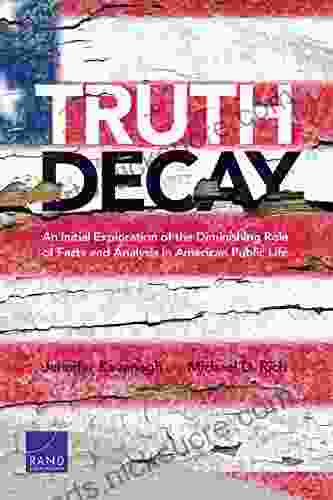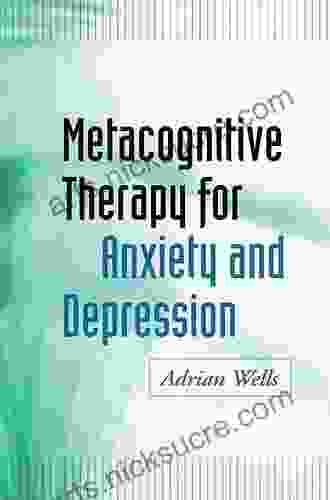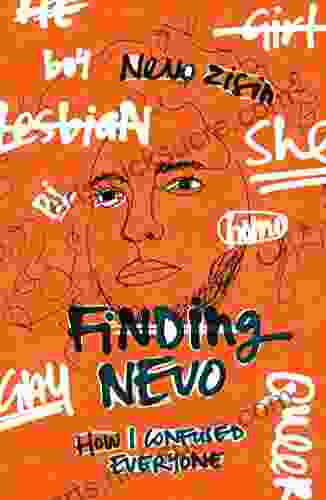Metacognitive Therapy for Anxiety and Depression: A Deep Dive into the Mind's Power

4.5 out of 5
| Language | : | English |
| File size | : | 5745 KB |
| Text-to-Speech | : | Enabled |
| Screen Reader | : | Supported |
| Enhanced typesetting | : | Enabled |
| Word Wise | : | Enabled |
| Print length | : | 316 pages |
Anxiety and depression are prevalent mental health conditions that affect millions worldwide, casting a shadow over their lives and dimming their potential. Traditional therapeutic approaches have often focused on addressing the symptoms of these conditions, but Metacognitive Therapy (MCT) takes a groundbreaking step forward by targeting the root cause: the metacognitive processes that maintain and perpetuate anxiety and depression.
MCT is a relatively new form of psychotherapy that has garnered significant attention for its effectiveness in treating anxiety and depression. Unlike traditional cognitive therapy, which primarily focuses on identifying and changing dysfunctional thoughts, MCT delves deeper into the metacognitive level, examining the processes that govern how we think about our thoughts, emotions, and experiences.
Principles of Metacognitive Therapy
MCT is founded on the premise that individuals with anxiety and depression often get trapped in a vicious cycle of unhelpful thinking patterns. These patterns, known as metacognitive beliefs, can be summarized as follows:
- Positive beliefs about worry: Believing that worry is helpful, productive, and necessary for preventing negative outcomes.
- Negative beliefs about uncontrollability: Believing that anxiety and depression are uncontrollable and unmanageable.
- Negative beliefs about oneself: Believing that one is weak, incapable, or unworthy, leading to feelings of self-doubt and inadequacy.
These metacognitive beliefs act as a self-perpetuating cycle, reinforcing negative thoughts and emotions. MCT aims to break this cycle by challenging these unhelpful patterns and teaching individuals how to develop more adaptive and realistic thinking styles.
Techniques of Metacognitive Therapy
MCT employs a range of techniques to help individuals identify, challenge, and modify their metacognitive beliefs. These techniques include:
- Mindfulness: Practicing mindfulness helps individuals become more aware of their thoughts, emotions, and bodily sensations, allowing them to observe these experiences without judgment.
- Attention training: MCT teaches individuals how to shift their attention away from negative thoughts and toward more positive and constructive ones.
- Problem solving: MCT encourages individuals to break down problems into smaller, more manageable steps, promoting a sense of control and empowering them to find solutions.
- Cognitive restructuring: MCT helps individuals identify and challenge their unhelpful thinking patterns, replacing them with more realistic and adaptive beliefs.
Evidence for the Effectiveness of Metacognitive Therapy
Numerous clinical trials have demonstrated the efficacy of MCT for anxiety and depression. For example, a study published in the journal "Psychological Medicine" found that MCT was significantly more effective than usual care in reducing symptoms of generalized anxiety disorder (GAD).
Another study, published in the journal "The Lancet," found that MCT was as effective as antidepressant medication in treating major depressive disorder (MDD). Furthermore, MCT has been shown to have long-lasting effects, with improvements in symptoms maintained even after treatment is completed.
Metacognitive Therapy is a transformative approach to treating anxiety and depression. By targeting the metacognitive processes that perpetuate these conditions, MCT empowers individuals to take control of their thoughts and emotions, break free from unhelpful thinking patterns, and cultivate a more positive and fulfilling life.
If you are struggling with anxiety or depression, MCT may be the path to lasting recovery and well-being. By embracing the principles and techniques of MCT, you can embark on a journey of self-discovery and unlock the potential for a life unburdened by mental health challenges.
4.5 out of 5
| Language | : | English |
| File size | : | 5745 KB |
| Text-to-Speech | : | Enabled |
| Screen Reader | : | Supported |
| Enhanced typesetting | : | Enabled |
| Word Wise | : | Enabled |
| Print length | : | 316 pages |
Do you want to contribute by writing guest posts on this blog?
Please contact us and send us a resume of previous articles that you have written.
 Fiction
Fiction Non Fiction
Non Fiction Romance
Romance Mystery
Mystery Thriller
Thriller SciFi
SciFi Fantasy
Fantasy Horror
Horror Biography
Biography Selfhelp
Selfhelp Business
Business History
History Classics
Classics Poetry
Poetry Childrens
Childrens Young Adult
Young Adult Educational
Educational Cooking
Cooking Travel
Travel Lifestyle
Lifestyle Spirituality
Spirituality Health
Health Fitness
Fitness Technology
Technology Science
Science Arts
Arts Crafts
Crafts DIY
DIY Gardening
Gardening Petcare
Petcare Richard J Larsen
Richard J Larsen Leckie
Leckie Gregory Curtis
Gregory Curtis Mark Cucuzzella
Mark Cucuzzella Gary Lonesborough
Gary Lonesborough James C Dobson
James C Dobson Meghan Mccarthy Mcphaul
Meghan Mccarthy Mcphaul S Yates
S Yates Mona Liza Santos
Mona Liza Santos Ed Hanczaryk
Ed Hanczaryk Timothy J Baroni
Timothy J Baroni Elizabeth Parker
Elizabeth Parker Jo Deurbrouck
Jo Deurbrouck Melinda Folse
Melinda Folse Vedant J Maheshwari
Vedant J Maheshwari Timothy Malcolm
Timothy Malcolm Kevin J Cheek
Kevin J Cheek Lynne Kelly
Lynne Kelly Jeff Wallach
Jeff Wallach Joe Harkness
Joe Harkness Elias Johnson
Elias Johnson Adam Weymouth
Adam Weymouth Sam L Savage
Sam L Savage Kendare Blake
Kendare Blake Elizabeth De Zulueta
Elizabeth De Zulueta Amy Kovarick
Amy Kovarick Dirk Baker
Dirk Baker John Martin Taylor
John Martin Taylor Zainab Yate
Zainab Yate Jacqueline Houtman
Jacqueline Houtman John D Whidden
John D Whidden Michelle Reid
Michelle Reid Mary Roach
Mary Roach Tina L Quick
Tina L Quick Susan Adams
Susan Adams David Sloan Wilson
David Sloan Wilson Jess Thomson
Jess Thomson C K Murray
C K Murray Alvin Boyd Kuhn
Alvin Boyd Kuhn Adam Schupak
Adam Schupak Trisha Yearwood
Trisha Yearwood Peter L Bernstein
Peter L Bernstein Gerry Giovinco
Gerry Giovinco Adriana Rabinovich
Adriana Rabinovich Amy Racina
Amy Racina Thomas Pranio
Thomas Pranio Pete Jordan
Pete Jordan Dr Paul Lam
Dr Paul Lam Alex Aster
Alex Aster Barry Glassner
Barry Glassner Joanna Warrington
Joanna Warrington Kevin Greene
Kevin Greene Charles R Swindoll
Charles R Swindoll Charles Dougherty
Charles Dougherty David Blatner
David Blatner Jennifer Justus
Jennifer Justus Kevin Van Whye
Kevin Van Whye Adrian Lobley
Adrian Lobley Alondra Nelson
Alondra Nelson Adam Stevenson
Adam Stevenson Myatt Murphy
Myatt Murphy Susannah Cahalan
Susannah Cahalan Emily Larson
Emily Larson Ayelet Fishbach
Ayelet Fishbach Afra J Zomorodian
Afra J Zomorodian Adrienne Tooley
Adrienne Tooley Aditya Chatterjee
Aditya Chatterjee Konstantinos Mylonas
Konstantinos Mylonas Veronica Strang
Veronica Strang Chuck Mckeever
Chuck Mckeever Julie Gore
Julie Gore Colin Pask
Colin Pask Jason Browne
Jason Browne Gene Hill
Gene Hill Adam Serwer
Adam Serwer Wendy Heard
Wendy Heard Karl Sigmund
Karl Sigmund James Mcdougall
James Mcdougall Frank C Keil
Frank C Keil Adrian Bardon
Adrian Bardon Rod Heckelman
Rod Heckelman Renato Rosaldo
Renato Rosaldo Paul Weamer
Paul Weamer Mihaly Csikszentmihalyi
Mihaly Csikszentmihalyi Suzanne Swedo
Suzanne Swedo Herb Carnegie
Herb Carnegie Thomas E Gilson
Thomas E Gilson Sergei Urban
Sergei Urban C W Ceram
C W Ceram Greg Guest
Greg Guest Cindy Nana Parente
Cindy Nana Parente Akilah Hughes
Akilah Hughes Jacqueline Winspear
Jacqueline Winspear Marissa Anderson
Marissa Anderson Ursula Goodenough
Ursula Goodenough Andrea Ros
Andrea Ros Jordan Bone
Jordan Bone Gary Dean Quesenberry
Gary Dean Quesenberry Meg Cox
Meg Cox David Mcraney
David Mcraney Supana Onikage
Supana Onikage Tom Ryan
Tom Ryan George Yule
George Yule Jose Antonio Fernandez
Jose Antonio Fernandez Sun Yung Shin
Sun Yung Shin Hans Reichenbach
Hans Reichenbach John Feinstein
John Feinstein Adrian Li
Adrian Li Adrian Wilson
Adrian Wilson Adam Raider
Adam Raider Terri Paajanen
Terri Paajanen Robin L Rielly
Robin L Rielly Kirsten Watson
Kirsten Watson Aenghus Chisholme
Aenghus Chisholme Stephen Brennan
Stephen Brennan Staci Frenes
Staci Frenes Andrew Beyer
Andrew Beyer Michael H Lubetsky
Michael H Lubetsky Bobbie Ziemer
Bobbie Ziemer Eliane Kurbegov
Eliane Kurbegov Natalie Guenther
Natalie Guenther Angel Millar
Angel Millar Valerie Melvin
Valerie Melvin Suzy Giordano
Suzy Giordano Nancy Mellon
Nancy Mellon Jane M Healy
Jane M Healy Shawn Thornton
Shawn Thornton Harry Pearson
Harry Pearson Agnieszka Latocha
Agnieszka Latocha Scott O Dell
Scott O Dell Adam Shaw
Adam Shaw Mike Jacker
Mike Jacker Marta Szabo
Marta Szabo Team Golfwell
Team Golfwell Gianni Filippini
Gianni Filippini Bruce Hood
Bruce Hood Eric Hoffer
Eric Hoffer Normandi Ellis
Normandi Ellis Stephen Tignor
Stephen Tignor Adelheid A M Nicol
Adelheid A M Nicol Philip Gardiner
Philip Gardiner Gary R Miller
Gary R Miller Edgar Giffenig
Edgar Giffenig David Graeber
David Graeber Alexandra Christo
Alexandra Christo Maurice Isserman
Maurice Isserman Alexi Pappas
Alexi Pappas John Nero
John Nero Marta Alexander
Marta Alexander Phil Cousineau
Phil Cousineau Michael Brooks
Michael Brooks Gina Fava
Gina Fava Adiba Jaigirdar
Adiba Jaigirdar Jonathan Kozol
Jonathan Kozol Steve Mchugh
Steve Mchugh Rachel Ormston
Rachel Ormston Mel Levine
Mel Levine Elias M Stein
Elias M Stein Adrienne Rawlinson
Adrienne Rawlinson Adam Pertman
Adam Pertman Carmen Juncal
Carmen Juncal Bettina Elias Siegel
Bettina Elias Siegel James B Marsh
James B Marsh Philip Striano
Philip Striano Anita Shreve
Anita Shreve Karen Weekly
Karen Weekly Doki Cohen
Doki Cohen Brad Borkan
Brad Borkan Rusty Richards
Rusty Richards Mary Ann Drummond
Mary Ann Drummond Malachi Martin
Malachi Martin Don Nehlen
Don Nehlen Melanie Mitchell
Melanie Mitchell Claire Heffron
Claire Heffron Archie Brain
Archie Brain John Vaillant
John Vaillant Isabella Rotman
Isabella Rotman Thich Nhat Hanh
Thich Nhat Hanh Michael S Weisbach
Michael S Weisbach Ahmad Al Sukaini
Ahmad Al Sukaini Joanne Jamrosz
Joanne Jamrosz Ron Elbe
Ron Elbe Michael D Rich
Michael D Rich Ken Jeremiah
Ken Jeremiah Aubre Tompkins Cnm
Aubre Tompkins Cnm Emily Ross
Emily Ross Frans X Plooij
Frans X Plooij Jeff Wiltse
Jeff Wiltse Afsaneh Moradian
Afsaneh Moradian Alisscia B
Alisscia B Brian J Lang
Brian J Lang Matt Morton
Matt Morton Taylor Markarian
Taylor Markarian Amby Cooper
Amby Cooper V C Andrews
V C Andrews Avner Ash
Avner Ash Cameo Renae
Cameo Renae Alvin E Roth
Alvin E Roth Ari Marmell
Ari Marmell Sarah Clarkson
Sarah Clarkson Adharanand Finn
Adharanand Finn Sherrie Nist Olejnik
Sherrie Nist Olejnik Doris J Barnes
Doris J Barnes Charles D Amico
Charles D Amico Gerry Lopez
Gerry Lopez Khalid Khashoggi
Khalid Khashoggi Bruce Rosenfeld
Bruce Rosenfeld J Lynn Bailey
J Lynn Bailey John Muir
John Muir Zachery Knowles
Zachery Knowles Todd Whitaker
Todd Whitaker Scott B Williams
Scott B Williams Nicholas Kardaras
Nicholas Kardaras Dorothy Hamill
Dorothy Hamill Barry Brown
Barry Brown Hannes Wessels
Hannes Wessels Kara Powell
Kara Powell Darron L Clark
Darron L Clark Kevin Biggar
Kevin Biggar Christina Cimorelli
Christina Cimorelli Lori Bregman
Lori Bregman Robert C Renneberg
Robert C Renneberg Shelley Metten M S Ph D
Shelley Metten M S Ph D Louisa J Morgan
Louisa J Morgan Tim Wise
Tim Wise Gena Showalter
Gena Showalter American Alpine Club
American Alpine Club Adrian Wallwork
Adrian Wallwork Andres Mooring
Andres Mooring Lily Luchesi
Lily Luchesi Jenny Jones
Jenny Jones Carol Grbich
Carol Grbich Heather D Yates
Heather D Yates Timothy Gowers
Timothy Gowers Agnes Light
Agnes Light Michael Kerrisk
Michael Kerrisk Adrienne Mayor
Adrienne Mayor John Hillman
John Hillman Mick Dolan
Mick Dolan Kosol Ouch
Kosol Ouch Terrence W Deacon
Terrence W Deacon Robert Stone
Robert Stone James Lovelock
James Lovelock Tony Herman
Tony Herman Daniel Sobieck
Daniel Sobieck Joseph Bruchac
Joseph Bruchac Barry Melrose
Barry Melrose Amy Blakeslee
Amy Blakeslee Barbara Mertz
Barbara Mertz Noah Michaud
Noah Michaud Paul Embrechts
Paul Embrechts Adrian Smith
Adrian Smith Slavka Bodic
Slavka Bodic Anita Bean
Anita Bean Karen J Bun
Karen J Bun Nicholas Carr
Nicholas Carr Dennis Cassinelli
Dennis Cassinelli Walter Rhein
Walter Rhein Peter Wayne
Peter Wayne Duffy Gaver
Duffy Gaver David A Whitsett
David A Whitsett Adrienne Young
Adrienne Young Ahmed Hulusi
Ahmed Hulusi Susan Rovezzi Carroll
Susan Rovezzi Carroll Lakshya Trivedi
Lakshya Trivedi Ben Marcus
Ben Marcus Adrian May
Adrian May Jenna Parker
Jenna Parker Rebecca Lowe
Rebecca Lowe Helen Scheuerer
Helen Scheuerer Don Webb
Don Webb Max Porter
Max Porter Ken Dehart
Ken Dehart Allen Hedrick
Allen Hedrick Ademar Aguiar
Ademar Aguiar Bryan Willis
Bryan Willis Simon Needham
Simon Needham Peter Shirley
Peter Shirley Adib Khorram
Adib Khorram Dagogo Altraide
Dagogo Altraide Max Jammer
Max Jammer Heather Worthington
Heather Worthington Kim Gosselin
Kim Gosselin Rick Sapp
Rick Sapp Peter Marshall
Peter Marshall Katarzyna Wac
Katarzyna Wac Meganne Forbes
Meganne Forbes Letitia Baldrige
Letitia Baldrige Patrick Hutchinson
Patrick Hutchinson Michael J Domitrz
Michael J Domitrz Ae Marling
Ae Marling George A Morgan
George A Morgan Timothy D Wilson
Timothy D Wilson Master Sajid Ahmed
Master Sajid Ahmed Mark Matlock
Mark Matlock The Times Mind Games
The Times Mind Games Julia V Taylor
Julia V Taylor Melvin Konner
Melvin Konner Mildred Johnson
Mildred Johnson Douglas H Macdonald
Douglas H Macdonald Adam Rutherford Phd
Adam Rutherford Phd Fergus Connolly
Fergus Connolly Eric Orton
Eric Orton Paul Parker
Paul Parker Cynthia A Robertson
Cynthia A Robertson Kathryn Casey
Kathryn Casey John Graves
John Graves Christina Shelley Albrecht
Christina Shelley Albrecht Richard Ray
Richard Ray Joseph Pred
Joseph Pred Stephen John Peel
Stephen John Peel Larry Clay
Larry Clay E Lockhart
E Lockhart Danny Wuerffel
Danny Wuerffel Jay Mcgraw
Jay Mcgraw Nomi Prins
Nomi Prins George Makari
George Makari Pearl S Buck
Pearl S Buck Paul L Wachtel
Paul L Wachtel Saidiya V Hartman
Saidiya V Hartman Debra D Sullivan
Debra D Sullivan Tessa Bielecki
Tessa Bielecki Lindsay Burton
Lindsay Burton Elizabeth Carman
Elizabeth Carman Adele Westbrook
Adele Westbrook Libbi Palmer
Libbi Palmer Warwick Rodwell
Warwick Rodwell Agatha Christie
Agatha Christie Julie Mohan
Julie Mohan Joe Varady
Joe Varady Kirk Deeter
Kirk Deeter Lucy Wolfe
Lucy Wolfe Andrea Huneeus Vergara
Andrea Huneeus Vergara Philip Maffetone
Philip Maffetone M Barlow Pepin
M Barlow Pepin Frank Delaney
Frank Delaney Alex Tremm
Alex Tremm Robyn Wideman
Robyn Wideman Fred Luskin
Fred Luskin Mark Bittman
Mark Bittman Christy Isbell
Christy Isbell Natania Barron
Natania Barron John Shelton Reed
John Shelton Reed Mayuri Saxena
Mayuri Saxena Afrodite Rossini
Afrodite Rossini Brittany Konsella
Brittany Konsella Seth Berkman
Seth Berkman Joseph A Durlak
Joseph A Durlak Bonnie Raingruber
Bonnie Raingruber Adam Woodbeck
Adam Woodbeck Craig Wiggers
Craig Wiggers Bridget Bishop
Bridget Bishop Jeff Van West
Jeff Van West C S Pacat
C S Pacat Balazs Csigi
Balazs Csigi Kieran Higgins
Kieran Higgins Adrian Gonzales
Adrian Gonzales Martin Dorey
Martin Dorey Liao Yiwu
Liao Yiwu Boy Scouts Of America
Boy Scouts Of America Seymour Lipschutz
Seymour Lipschutz Adrian Wells
Adrian Wells Max Mason
Max Mason Michael Mcteigue
Michael Mcteigue Brad Rock
Brad Rock D J Conway
D J Conway Yusra Mardini
Yusra Mardini Aftab Hamid
Aftab Hamid Basil Pickard
Basil Pickard Shami Stovall
Shami Stovall Peggy Tharpe
Peggy Tharpe Herbert L Roitblat
Herbert L Roitblat Zoe Clark Coates
Zoe Clark Coates Dan Fagin
Dan Fagin Adam Ploszaj
Adam Ploszaj Yuu Tanaka
Yuu Tanaka Carl Johan Calleman
Carl Johan Calleman Greg Wyshynski
Greg Wyshynski Nicole Spindler
Nicole Spindler Harper Paris
Harper Paris Alicia Young
Alicia Young Adrienne Engleman Pga Fellow Professional
Adrienne Engleman Pga Fellow Professional Laura Zinn Fromm
Laura Zinn Fromm Si Robertson
Si Robertson John Passmore
John Passmore Zhongwen Fu
Zhongwen Fu Kate Wickers
Kate Wickers Susy Lee
Susy Lee Issendai Bechau
Issendai Bechau Darrell Huff
Darrell Huff Jack Heinowitz
Jack Heinowitz Allie Duzett
Allie Duzett Leigh Bardugo
Leigh Bardugo Oscar Ratti
Oscar Ratti Kenneth Martz
Kenneth Martz Mickey Royal
Mickey Royal Marie Colvin
Marie Colvin Jasmine Taylor
Jasmine Taylor Herbert Clyde Lewis
Herbert Clyde Lewis Kathy Toney
Kathy Toney Rich Froning
Rich Froning Christopher Pike
Christopher Pike P Brian Noble
P Brian Noble Eric Adelson
Eric Adelson Laura Fuentes
Laura Fuentes Jd Richey
Jd Richey Mariel Hemingway
Mariel Hemingway James P Lewis
James P Lewis Marty Ofonagoro
Marty Ofonagoro Annie Gilbert Coleman
Annie Gilbert Coleman Nicole Bailey
Nicole Bailey Joshua Baker
Joshua Baker Heidi Dusek
Heidi Dusek Haym Kruglak
Haym Kruglak Robin Suerig Holleran
Robin Suerig Holleran Jeff Hutton
Jeff Hutton Sylvia Nasar
Sylvia Nasar Baby Professor
Baby Professor Brian K Jones
Brian K Jones Susan Garcia
Susan Garcia George Sheehan
George Sheehan Ken Robinson
Ken Robinson Shmuel Goldberg
Shmuel Goldberg Moon Ho Jung
Moon Ho Jung Jorge Luis Delgado
Jorge Luis Delgado Frederick J Gravetter
Frederick J Gravetter Kathy A Zahler
Kathy A Zahler Collins Easy Learning
Collins Easy Learning Robin Jones Gunn
Robin Jones Gunn Nelson L Schuman
Nelson L Schuman Noson S Yanofsky
Noson S Yanofsky Kamala Harris
Kamala Harris Dale F Bloom
Dale F Bloom John North
John North Helen Xander
Helen Xander Daniel Kahneman
Daniel Kahneman Joe Posnanski
Joe Posnanski Loren Cordain
Loren Cordain Adam Shoalts
Adam Shoalts Lydia Kang
Lydia Kang Heather Lende
Heather Lende Timothy Leffel
Timothy Leffel Ashley Bugge
Ashley Bugge Tim Hodkinson
Tim Hodkinson Deborah Grace White
Deborah Grace White Marcus Heerdt
Marcus Heerdt Monique Boutsiv
Monique Boutsiv Amy Bartelloni
Amy Bartelloni Jake Schafft
Jake Schafft Linus Wilson
Linus Wilson Spike Walker
Spike Walker Asrai Devin
Asrai Devin Michael Bronski
Michael Bronski Tommy Caldwell
Tommy Caldwell Ilene Skeen
Ilene Skeen William Smith
William Smith Luca Vargiu
Luca Vargiu Marc Roche
Marc Roche Sarah Stillman
Sarah Stillman Alexandra Horowitz
Alexandra Horowitz Lisa Mosconi
Lisa Mosconi Adele Faber
Adele Faber Adams Media
Adams Media David Churchman
David Churchman Sam Fadala
Sam Fadala Michele Angello
Michele Angello Nastassja Martin
Nastassja Martin Adele Jones
Adele Jones Tony Grice
Tony Grice Erin Eileen Leigh
Erin Eileen Leigh James Goi Jr
James Goi Jr Trevor Rowley
Trevor Rowley Wayne Curtis
Wayne Curtis Johnathon Allen
Johnathon Allen Dr James Dinicolantonio
Dr James Dinicolantonio Amelia Simmons
Amelia Simmons Joan Naidorf
Joan Naidorf Leslie T Chang
Leslie T Chang Dwayne Bryant
Dwayne Bryant Bob Forsch
Bob Forsch Adrian Bejan
Adrian Bejan John D Mccann
John D Mccann
Light bulbAdvertise smarter! Our strategic ad space ensures maximum exposure. Reserve your spot today!
 Elmer PowellFollow ·17.9k
Elmer PowellFollow ·17.9k Grayson BellFollow ·16.5k
Grayson BellFollow ·16.5k Trevor BellFollow ·14.8k
Trevor BellFollow ·14.8k Edgar HayesFollow ·8.2k
Edgar HayesFollow ·8.2k John GreenFollow ·10.7k
John GreenFollow ·10.7k Oscar BellFollow ·3.7k
Oscar BellFollow ·3.7k Roger TurnerFollow ·14.9k
Roger TurnerFollow ·14.9k Fyodor DostoevskyFollow ·8k
Fyodor DostoevskyFollow ·8k
 Cruz Simmons
Cruz SimmonsThe Ultimate Canadian Cookbook: A Culinary Exploration of...
Journey into the heart of Canadian cuisine...

 Grayson Bell
Grayson BellAn Initial Exploration Of The Diminishing Role Of Facts...
When we think of the digital age, we often...

 Jayden Cox
Jayden CoxHollywood Trainer's Real Guide to Getting the Body You've...
Achieving a fit and...

 Octavio Paz
Octavio PazGood Walk Spoiled: An Exploration of the Effects of...
Dogs are often hailed...

 Jerome Powell
Jerome PowellMuhammad Allah Ahmed Hulusi: A Visionary Scholar and...
Muhammad Allah Ahmed Hulusi...
4.5 out of 5
| Language | : | English |
| File size | : | 5745 KB |
| Text-to-Speech | : | Enabled |
| Screen Reader | : | Supported |
| Enhanced typesetting | : | Enabled |
| Word Wise | : | Enabled |
| Print length | : | 316 pages |














